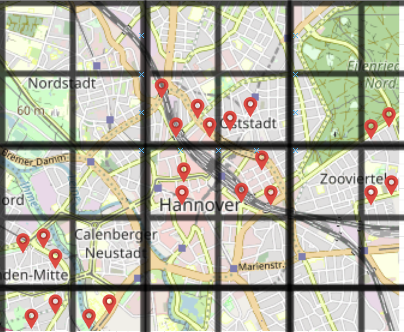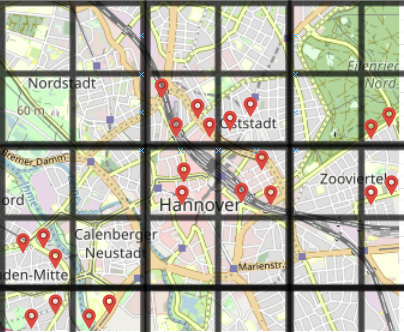Traffic accident prediction is a crucial task in the mobility domain. State-of-the-art accident prediction approaches are based on static and uniform grid-based geospatial aggregations, limiting their capability for fine-grained predictions. This property becomes particularly problematic in more complex regions such as city centers. In such regions, a grid cell can contain subregions with different properties; furthermore, an actual accident-prone region can be split across grid cells arbitrarily. This paper proposes Adaptive Clustering Accident Prediction (ACAP) - a novel accident prediction method based on a grid growing algorithm. ACAP applies adaptive clustering to the observed geospatial accident distribution and performs embeddings of temporal, accident-related, and regional features to increase prediction accuracy. We demonstrate the effectiveness of the proposed ACAP method using open real-world accident datasets from three cities in Germany. We demonstrate that ACAP improves the accident prediction performance for complex regions by 2-3 percent points in F1-score by adapting the geospatial aggregation to the distribution of the underlying spatio-temporal events. Our grid growing approach outperforms the clustering-based baselines by four percent points in terms of F1-score on average.
翻译:交通事故预测是流动领域的一项关键任务。 最新的最新事故预测方法基于静态和统一的基于电网的地理空间汇总,限制了其精确预测的能力。 在城市中心等更复杂的区域,这种财产特别成问题。 在这类区域,电网单元可以包含具有不同特性的次区域;此外,一个实际的事故易发区可以任意地在电网各单元之间分割。本文建议采用适应性集群事故预测法(ACAP)——一种基于电网增长算法的新型事故预测方法。ACAP将适应性集群应用于观测到的地理空间事故分布,并进行时间、事故相关和区域特征的嵌入,以提高预测准确性。我们用德国三个城市的开放现实世界事故数据集展示了拟议的ACAP方法的有效性。我们证明,ACAP将复杂区域的事故预测性能提高2.3%,使地理空间汇总与基本时空事件分布相适应。我们的电网发展方法比基于集群的基线高出平均F1核心的四个百分点。




